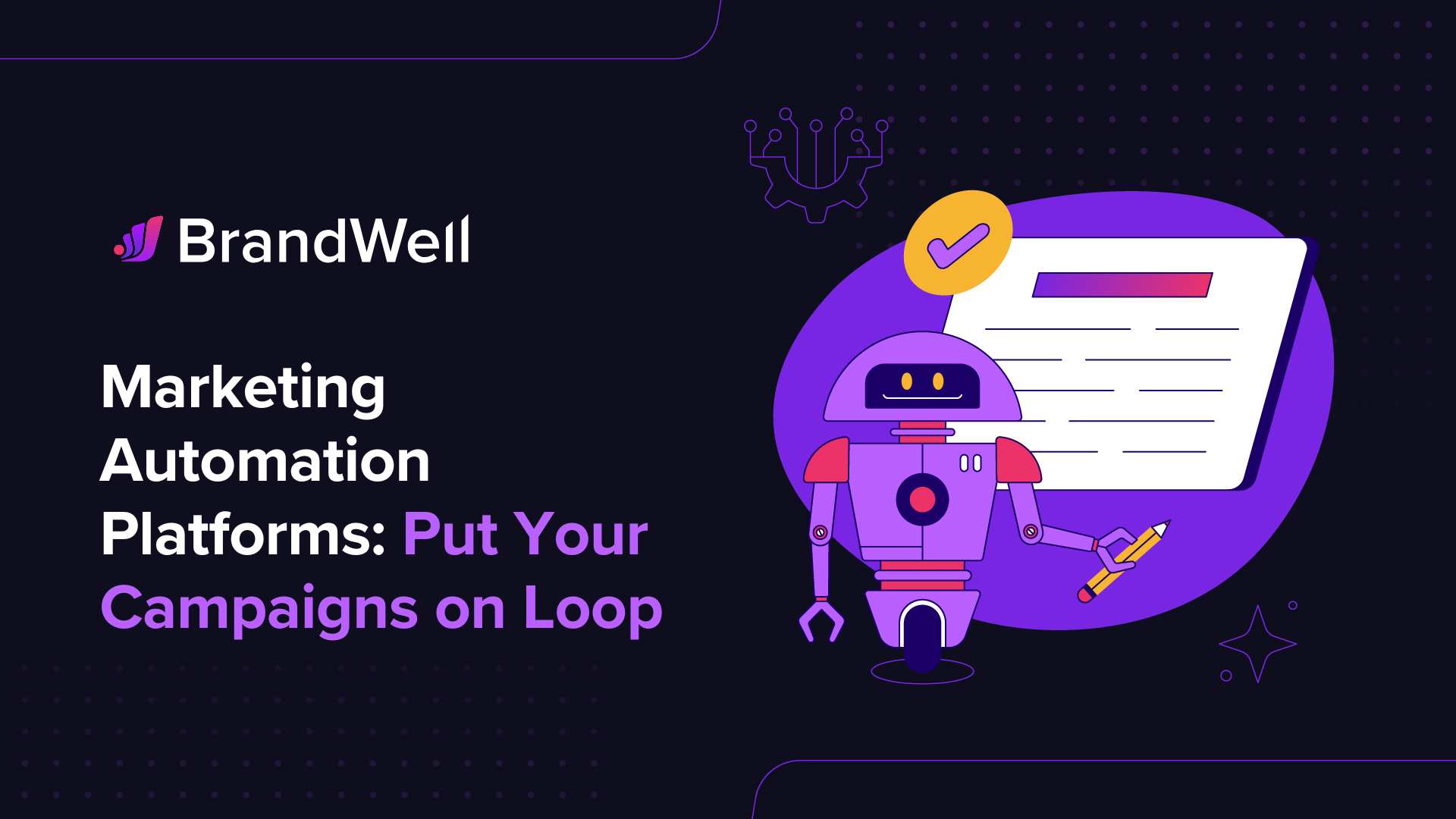As marketers, we always seek new ways to work smarter, not harder, right? That’s where a marketing automation platform can help.
With marketing automation, you can streamline tedious marketing tasks and nurture leads more effectively. Choosing the right platform and knowing what it actually does will save you tons of money and stress later on.
In this article, you’ll learn what a marketing automation platform is, how it can streamline your operations, and what features to look out for when choosing a platform for your marketing team.
Table Of Contents:
- What is a Marketing Automation Platform?
- Who Needs Marketing Automation Tools?
- Top Marketing Automation Platforms in 2025
- Choosing the Right Marketing Automation Software for Your Business
- FAQs – Marketing Automation Platforms
- Conclusion
What is a Marketing Automation Platform?
Think of marketing automation as your very own virtual marketing assistant (only much less expensive).
A marketing automation platform automates tasks such as email marketing, blog writing, social media posts, and even running ad campaigns.
These platforms do much more than scheduling; they can track leads, score them based on engagement, and even personalize a user’s experience.
The right marketing automation platform can truly be an all-in-one solution for your marketing strategy.
Benefits of Marketing Automation Software
Many marketers report seeing significant results in a short time. But why should you invest in marketing automation?
Improved Efficiency and Productivity
By automating those tedious, repetitive tasks (we’re looking at you, social media scheduling), you’ll free up valuable time to work on high-level strategy and creative campaigns.
Need to send welcome emails to every new subscriber? Instead of manually doing this for hundreds or thousands of leads, an email automation solution like MailChimp can automate this process for you.
Need to write a hundred product descriptions? Leave it to BrandWell, a powerful all-in-one content marketing platform that can produce any type of content — from long-form SEO blog posts to quick product summaries — without landing you in hot water for duplicate content.
Enhanced Lead Nurturing and Qualification
It can be difficult to “funnel” customers when they’re at different stages of the buying cycle. Marketing automation can segment audiences, deliver targeted content based on user behavior, and guide prospects through the sales funnel with little effort from your marketing team.
Data-Driven Decision Making
If your marketing efforts aren’t data-driven, are you even making a real effort?
A marketing automation platform provides marketers with vital customer data and insights. You’ll better understand what works (and what doesn’t), which campaigns are performing well, and can even see where leads are dropping off.
Powerful, right?
Personalized Customer Experiences
Marketing is all about creating a stellar customer experience.
These days, consumers want a more personalized experience. Personalization is more than simply addressing users by their first name in emails; it involves using data about their behaviors to anticipate needs and preferences.
Providing great marketing through relevant content is essential to keeping your prospects engaged.
By automating mundane tasks like scheduling posts or sending emails, marketers can free up more time for creative activities like developing content strategies or optimizing website pages for SEO purposes.
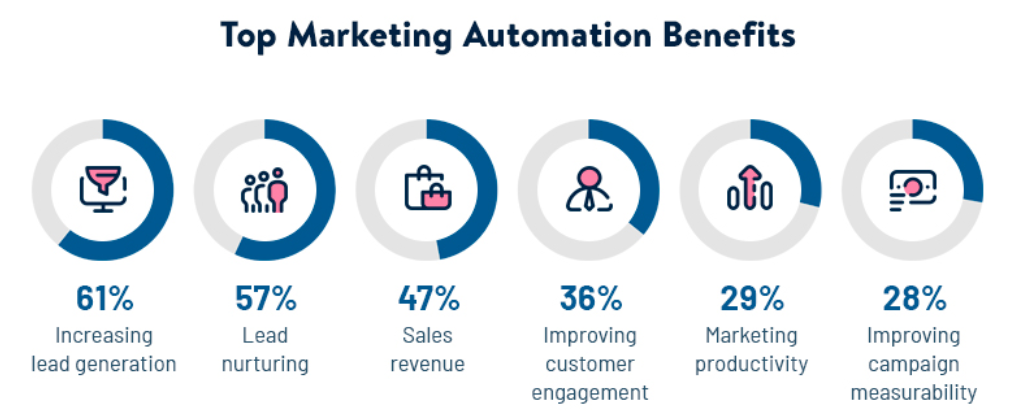
Source: 99 Firms
Who Needs Marketing Automation Tools?
Marketing automation tools are invaluable assets for a diverse range of individuals and organizations looking to streamline their marketing efforts, ensure efficient communication with their audience, and optimize the return on investment from their marketing campaigns.
The primary beneficiaries include:
Digital Marketers: They rely heavily on automation tools to manage large-scale campaigns across multiple channels, allowing them to focus on strategy over repetitive tasks.
Businesses with Complex Sales Cycles: Companies that have long sales cycles may find it difficult to manage the entire process manually. Marketing automation software can help by automating tasks such as lead scoring, nurturing campaigns, and email follow-ups. This allows companies to focus on more important aspects of the sales cycle while still ensuring leads are nurtured properly.
E-commerce Businesses: Automation is crucial for personalizing customer interactions at scale — such as cart abandonment emails or product recommendations — driving higher conversion rates.
Small Business Owners: Often operating with limited resources, they find that automating social media posts, email responses, and other aspects of digital engagement helps them compete more effectively without expanding staff.
Marketing Agencies: They leverage such platforms extensively to handle multiple client accounts seamlessly while offering sophisticated reporting capabilities back to clients.
Content Creators/Publishers: For those who generate content regularly (bloggers/vloggers), these tools help in scheduling publication times and managing subscriber lists efficiently.
B2B Companies: B2B marketers utilize these systems for longer sales cycles involving numerous touchpoints; it assists in nurturing leads until they’re ready to engage in a purchase decision.
Companies with Multiple Products or Services: Companies that offer multiple products or services often need to create separate campaigns to target different audiences effectively. Marketing automation software provides analytics so marketers can track how successful their campaigns are at driving conversions and revenue growth.
Event Organizers & Nonprofits: These groups benefit by automating invitations, follow-ups after events, or donation drives which would otherwise be highly time-consuming if done manually.
Enterprises Engaged In Account-Based Marketing (ABM): Targeting specific accounts requires personalized outreach at scale that’s only feasible through the effective use of automation technologies.
With automation tools, you can simply set your campaign parameters and put marketing tasks in a loop to achieve speedy results from your digital efforts.
Now let’s take a look at how to choose the best automation software for your business.
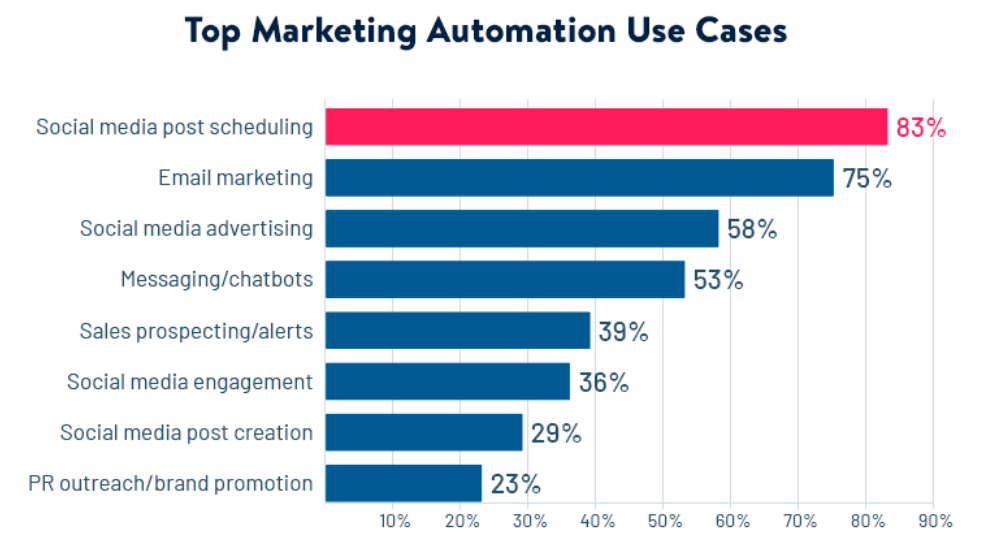
Top Marketing Automation Platforms in 2025
To help you decide which platforms can help your marketing automation efforts in 2025, here’s a look at top-tier automation tools that are best in class.
BrandWell
- Best for writing marketing content (long-form and short-form)
- $249/month with 7-day free trial
BrandWell is a powerful brand growth engine that puts our entire content marketing process on autopilot. Create blog posts, ad copy, marketing emails, landing pages, product descriptions, sales letters, and social media posts within minutes!
Long-form content is where BrandWell truly shines. Everything is done for you – title, meta description, headers, table of contents, internal and external links, and even an intro hook and custom call to action. All you have to do is type in the long-tail keywords you want to rank for and you get your first draft in five minutes instead of five hours.
You also have access to an entire array of SEO tools right inside the app so you can optimize your post while you are editing. These include keyword research, topic clustering, tone checker, NLP salience scores, optimization audits, a free plagiarism scan, and AI detection.
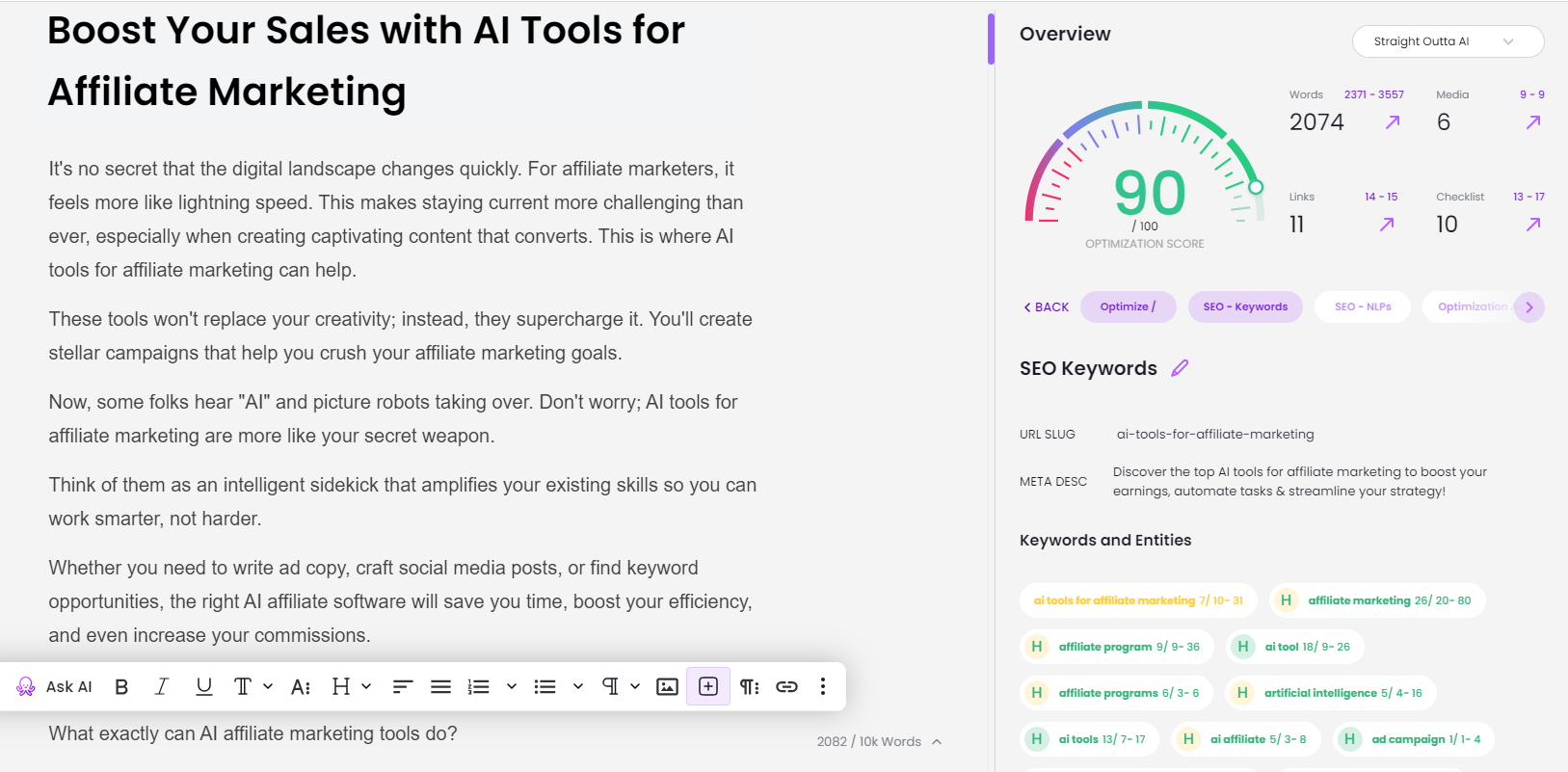
BrandWell syncs directly to WordPress and Shopify so you can publish your blog post in an instant.
BrandWell also has a generative AI component. The AIMEE chatbot and 40+ specialized AI Agents are all at your fingertips, ready to churn out any type of content for any topic you may need.
I use BrandWell to write almost ALL of my LinkedIn posts. Here’s one that was written recently by the AI Agent for LinkedIn Stories:
HubSpot CRM
- Best for customer relationship management (CRM)
- Plans start at $360/month with a free 14-day trial
HubSpot is one of the leading players in the marketing automation space. This all-in-one software helps companies manage their entire customer lifecycle — from lead generation to conversion. With its intuitive user interface and powerful analytics, HubSpot makes it easy to quickly create campaigns and track results.
Additionally, HubSpot integrates seamlessly with other popular applications such as Salesforce CRM and WordPress CMS so users can easily sync data across multiple systems.

Adobe Marketo Engage
- Best for marketing campaign management
- Plans start at $895/month
Marketo, acquired by Adobe, is another well-known name in the industry. It offers a comprehensive solution for automating email, socials, search engine optimization (SEO), and events management.
Marketo also offers powerful segmentation capabilities that allow users to target specific audiences based on criteria such as demographics or interests. This makes it easier for marketers to tailor content specifically for each individual recipient – increasing engagement rates while reducing overall costs associated with running campaigns.
Its integration with Salesforce ensures seamless data management between marketing and sales teams.
Enterprises looking for a high-performance solution to execute multi-channel campaigns at scale will benefit the most. However, Marketo’s steep learning curve and premium pricing may be challenging for smaller teams.
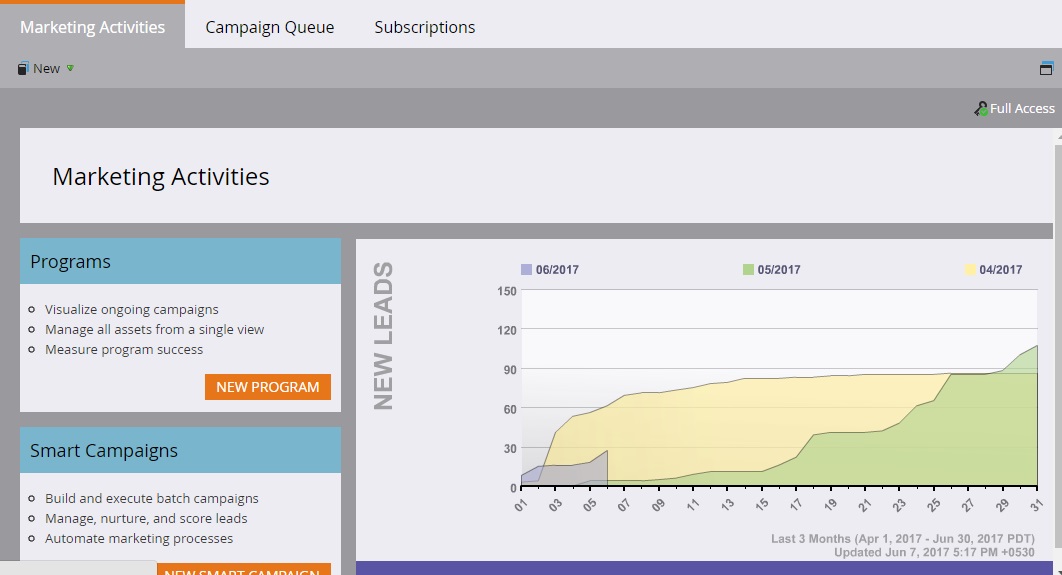
Pardot
- Best for B2B marketing
- Plans start at $1,250/month
Pardot is a B2B-oriented sales automation platform created to assist sales teams in automating lead nurturing activities such as email outreach and website personalization strategies. It has features like automated scoring models that assess how prospects interact with your brand over time, dynamic lists that enable you to categorize contacts, advanced reporting, A/B testing, and integration with third-party services including Google Analytics.
If you’re looking for an all-inclusive solution, then Pardot may be the right choice for you.
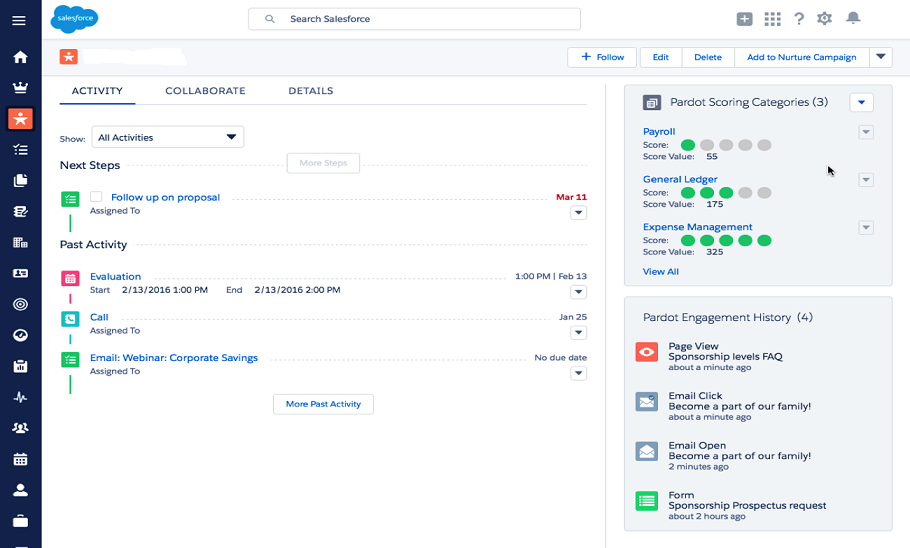
Eloqua
- Best for B2B marketing campaign management
- Plans start at $2,000/month
Eloqua is a powerful marketing automation platform designed for enterprise-level businesses. It’s one of the most feature-rich and expensive solutions on the market, but it comes with exceptional customer service and plenty of integrations.
Eloqua offers email marketing, lead scoring, analytics, A/B testing, automated campaigns, landing pages, CRM integration, and more. Plus, they offer 24/7 support via phone and personalized training sessions that demonstrate their commitment to customer service.
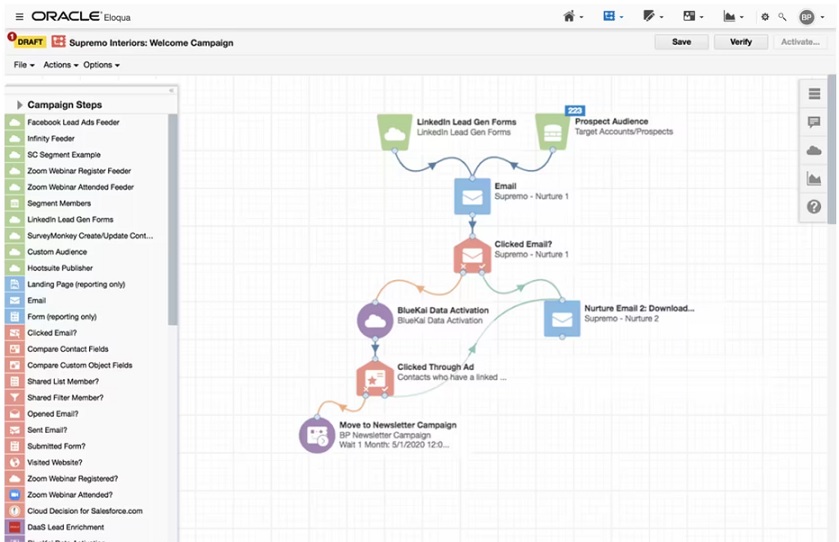
Customer.io
- Best for email marketing
- Plans start at $100/month
Customer.io helps businesses send personalized emails and messages to their customers. This beginner-friendly app stands out for its easy-to-use interface and fast customer support.
What makes Customer.io unique is its ability to send trigger emails based on events rather than just pageviews or time-based intervals. This makes it much easier to personalize your messages and target them more accurately according to user behavior or preferences.
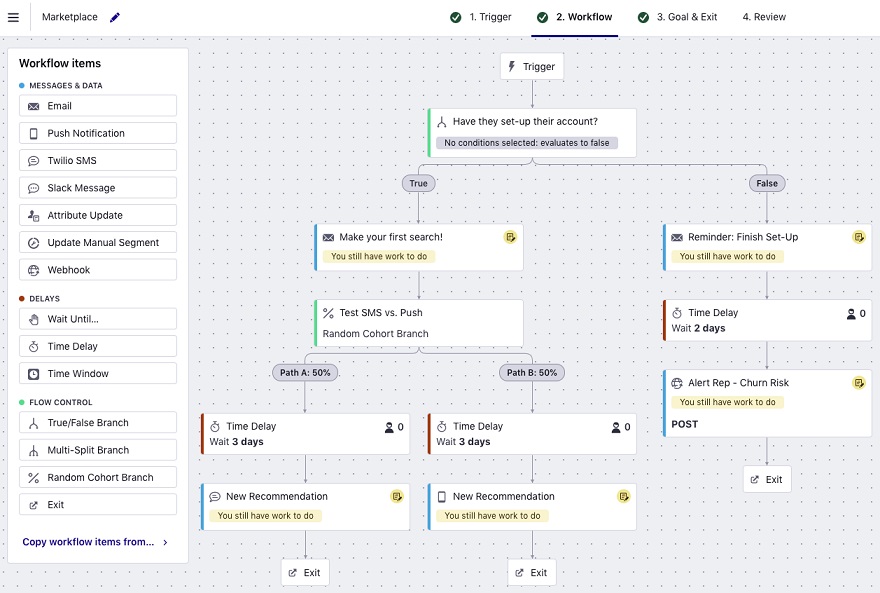
Autopilot
- Best for visual marketing automation
- Free trial available
Autopilot is known for its visually intuitive automation builder, making it easy to design customer journeys across multiple channels, including email, SMS, and in-app messaging. Businesses can create highly personalized workflows using a simple drag-and-drop interface, making complex automation accessible to teams of all sizes.
Companies looking for a straightforward yet powerful automation platform will benefit the most. However, while it excels in automation, it lacks some of the advanced CRM features offered by competitors.
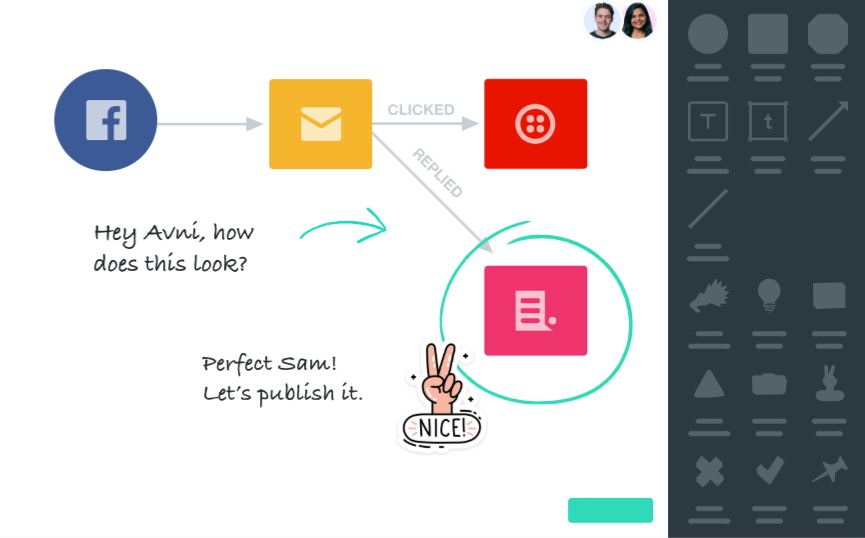
Mailchimp
- Best for email marketing
- Plans start at $13/month with a free 30-day trial
Mailchimp is the most popular email marketing tool today. But it’s more than just that.
Mailchimp lets you manage your entire marketing workflow from one central location. From email campaigns and surveys to e-commerce and CRM features, Mailchimp has everything you need for effective digital marketing.
With Mailchimp, you can create highly personalized emails with ease. Design custom templates or choose from pre-made ones from the library of professionally designed options. You also have access to advanced segmentation tools so you can target your messages more precisely.
Plus, with AB testing capabilities, you’ll be able to measure the effectiveness of each campaign quickly and accurately.
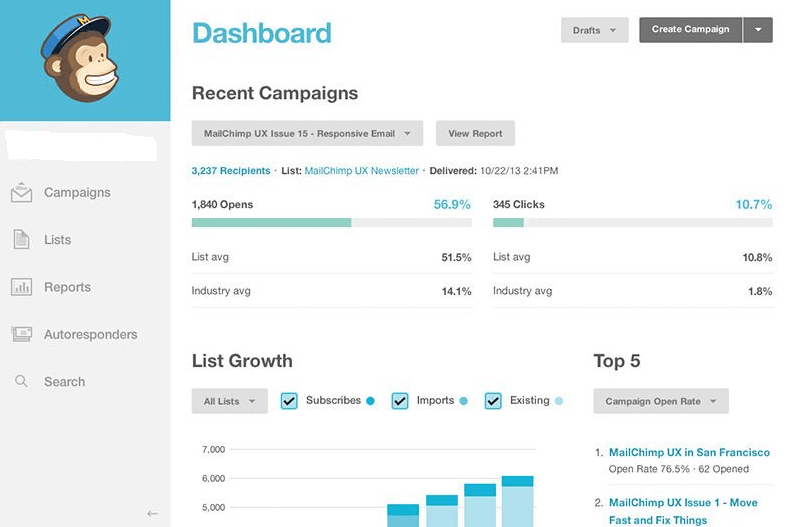
Drip
- Best for e-commerce customer journeys
- Starts at $39/month
Drip is an advanced marketing automation tool tailored for online retailers looking to create seamless, multi-step customer journeys. It allows businesses to set up behavior-triggered email and SMS campaigns that guide shoppers from first interaction to repeat purchases.
With its deep Shopify and WooCommerce integrations, Drip provides rich customer insights, helping brands optimize their messaging.
It’s particularly useful for businesses focused on lifecycle marketing and increasing customer retention. While it excels in automation and segmentation, Drip does not include a built-in CRM, and its pricing may be prohibitive for smaller businesses.
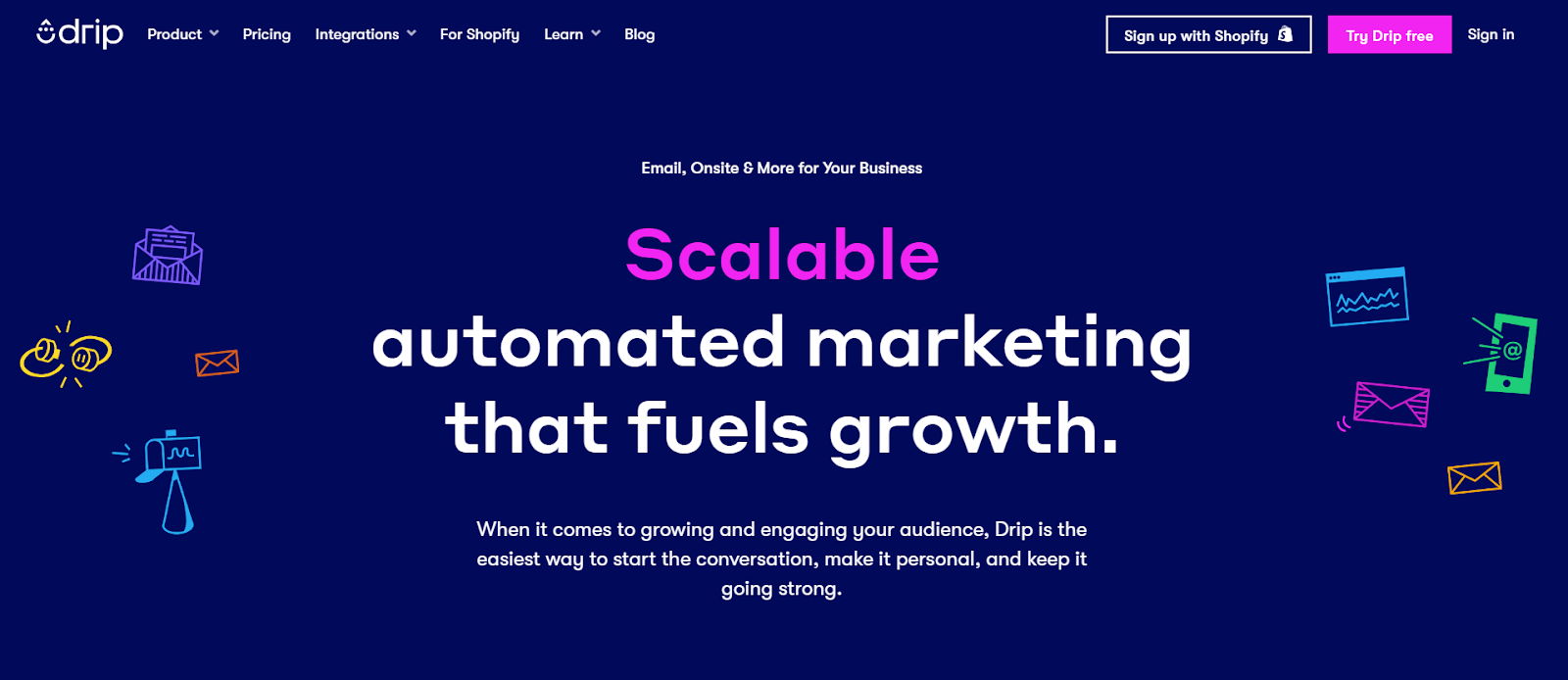
GetResponse
- Best for email marketing
- There’s a free plan with limited features. Paid plans start at $15.58/month
GetResponse is an all-in-one marketing automation software that offers powerful email, web chat, and SMS marketing tools. With its automated workflow capabilities, GetResponse makes it easy for marketers to set up complex campaigns without having to manually manage each step.
GetResponse has a drag-and-drop editor that allows users to customize emails with images and videos as well as design attractive landing pages in minutes.
And with integrated e-commerce capabilities like shopping cart integration and payment processing options, GetResponse makes it easy for businesses to accept payments directly from their website or blog posts without having to redirect customers elsewhere for more secure transactions.
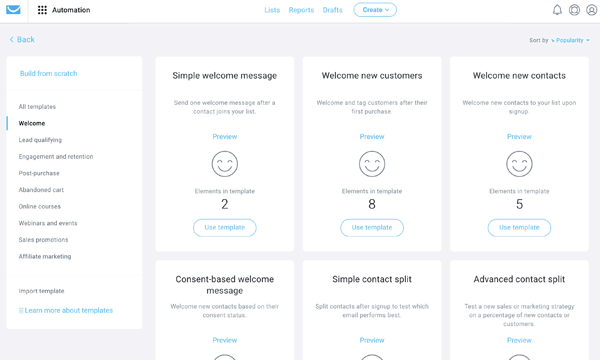
HubSpot Marketing Hub
- Best for all-in-one inbound marketing solutions
- Basic free tools available; premium plans start at $800/month
HubSpot Marketing Hub is an industry leader in inbound marketing, offering tools that cater to businesses looking to attract, engage, and convert leads seamlessly. From SEO optimization and content creation to automated email campaigns and lead nurturing, HubSpot centralizes marketing efforts within an intuitive dashboard. Its deep CRM integration allows businesses to track customer interactions from initial contact to conversion.
Ideal for businesses committed to content-driven marketing strategies, HubSpot stands out for its educational resources and seamless user experience. However, advanced features are locked behind higher-priced tiers, making it costly to scale businesses.
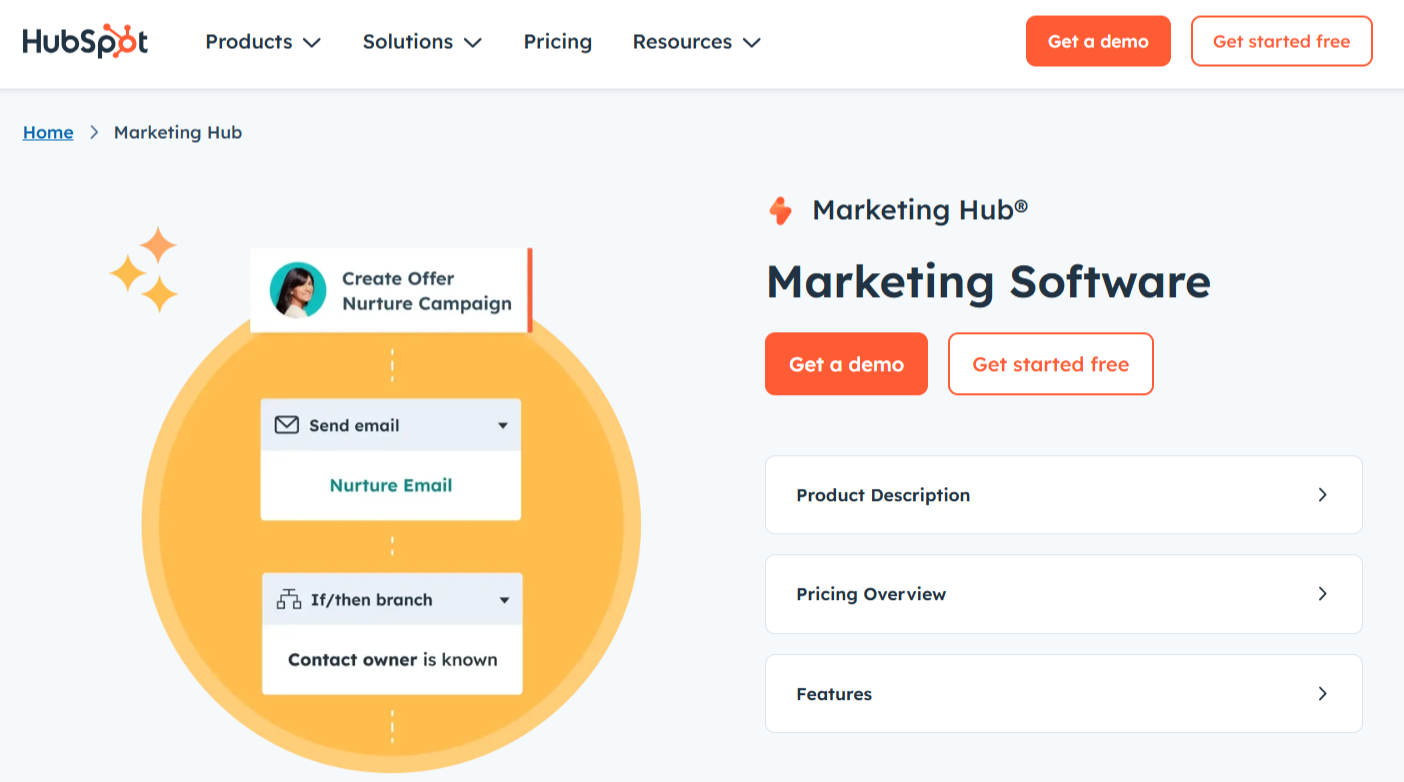
ActiveCampaign
- Best for email automation and CRM integration
- Price starts at $15/month
ActiveCampaign is a feature-rich marketing platform that combines email automation with an integrated CRM to help businesses nurture leads and build meaningful customer relationships. Its automation builder allows users to craft sophisticated workflows that adapt based on user behavior, ensuring highly targeted communication.
The platform’s predictive sending technology optimizes email delivery times for maximum engagement.
Small to mid-sized businesses looking for a tool that simplifies customer engagement while offering deep automation will find ActiveCampaign invaluable. However, newcomers may face a steep learning curve, and costs can rise quickly as subscriber lists grow.
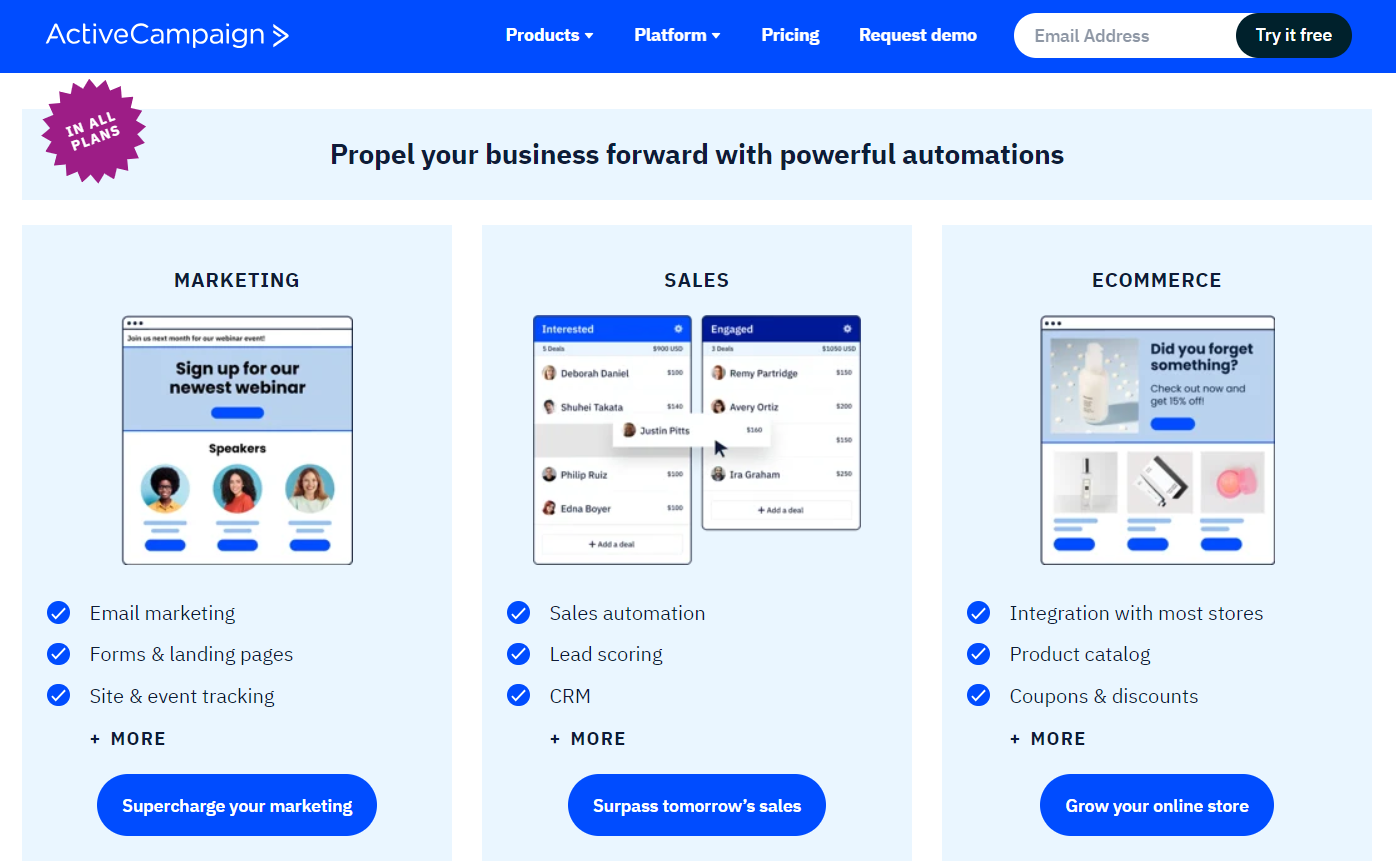
Klaviyo
- Best for data-driven e-commerce marketing
- Free for up to 250 contacts; paid plans start at $45/month
Klaviyo is a powerhouse for e-commerce brands seeking data-driven marketing solutions. It offers in-depth customer analytics, behavior-based segmentation, and predictive modeling, allowing businesses to craft hyper-personalized email and SMS campaigns.
Its ability to sync with e-commerce platforms ensures real-time tracking of customer actions, enabling brands to automate targeted responses such as abandoned cart reminders or post-purchase follow-ups.
Brands focused on personalization and revenue optimization will find Klaviyo indispensable. However, the platform’s extensive features come with a learning curve, and pricing can escalate for larger contact lists.
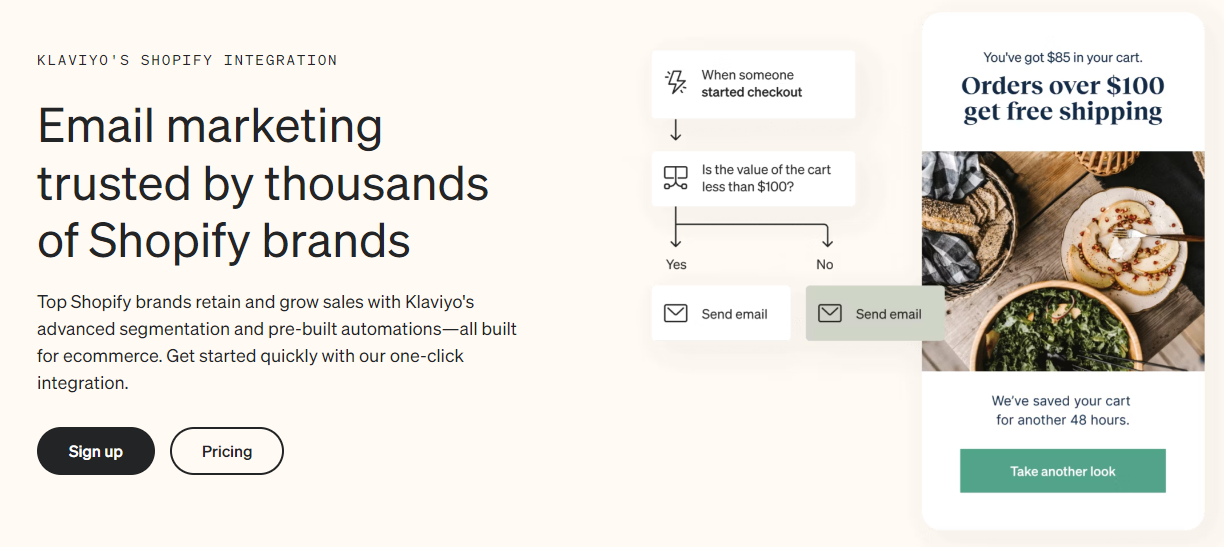
Omnisend
- Best for e-commerce email and SMS marketing
- Free plan available; paid plans start at $11.20/month
Omnisend is a marketing automation platform designed specifically for e-commerce brands, offering seamless integrations with platforms like Shopify, WooCommerce, and Magento. Its multi-channel approach allows users to engage customers through email, SMS, and push notifications, making it a versatile tool for online stores looking to boost conversions.
With a drag-and-drop email editor, dynamic segmentation, and pre-built automation workflows, Omnisend simplifies the process of crafting personalized shopping experiences.
E-commerce businesses aiming to increase retention and recover abandoned carts will benefit the most. However, its reporting features could be more advanced, and SMS costs can add up quickly.
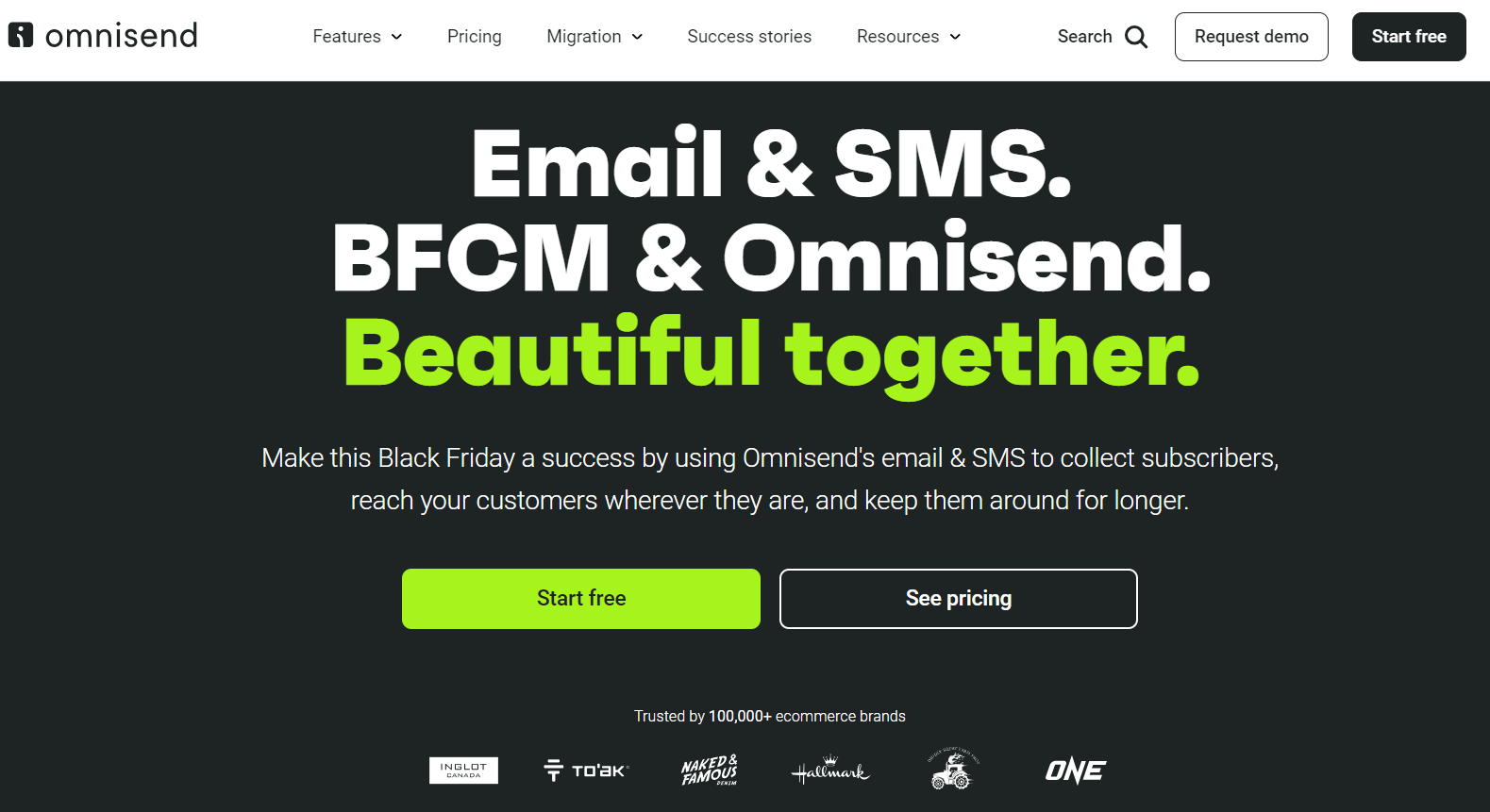
Salesforce Marketing Cloud
- Best for enterprise-level customer engagement
- Starts at $1,250/month, custom pricing available
Salesforce Marketing Cloud is a high-end marketing automation platform designed for large enterprises that require data-driven, multi-channel engagement. It offers AI-powered personalization, customer segmentation, and predictive analytics to deliver hyper-targeted marketing campaigns.
With seamless integration into the Salesforce ecosystem, it provides a unified view of customer interactions across all touchpoints.
Organizations that need scalable, enterprise-grade solutions will benefit the most. However, its complexity and pricing structure makes it less suitable for smaller businesses.

Act-On
- Best for advanced lead nurturing
- Starts at $900/month
Act-On is a powerful marketing automation platform designed for mid-sized and enterprise businesses that need advanced lead nurturing and segmentation. It provides deep analytics, customizable workflows, and integrations with major CRMs like Salesforce and Microsoft Dynamics.
With a focus on B2B marketing, Act-On helps businesses score leads, track engagement, and optimize their sales funnels. While its robust feature set makes it a strong choice for complex marketing operations, the high price tag may be a barrier for smaller businesses.

Brevo (formerly Sendinblue)
- Best for affordable email and SMS marketing
- Free plan available; paid plans start at $8/month
Brevo is an accessible yet powerful marketing solution for businesses seeking email and SMS marketing capabilities without breaking the bank. It offers automation workflows, AI-powered audience segmentation, and transactional email services, making it an excellent choice for startups and small businesses.
The platform’s built-in chat functionality allows businesses to engage with customers in real time, adding another layer to their marketing strategy.
While Brevo provides great value for money, its automation tools are not as advanced as some competitors, and the selection of third-party integrations is somewhat limited.
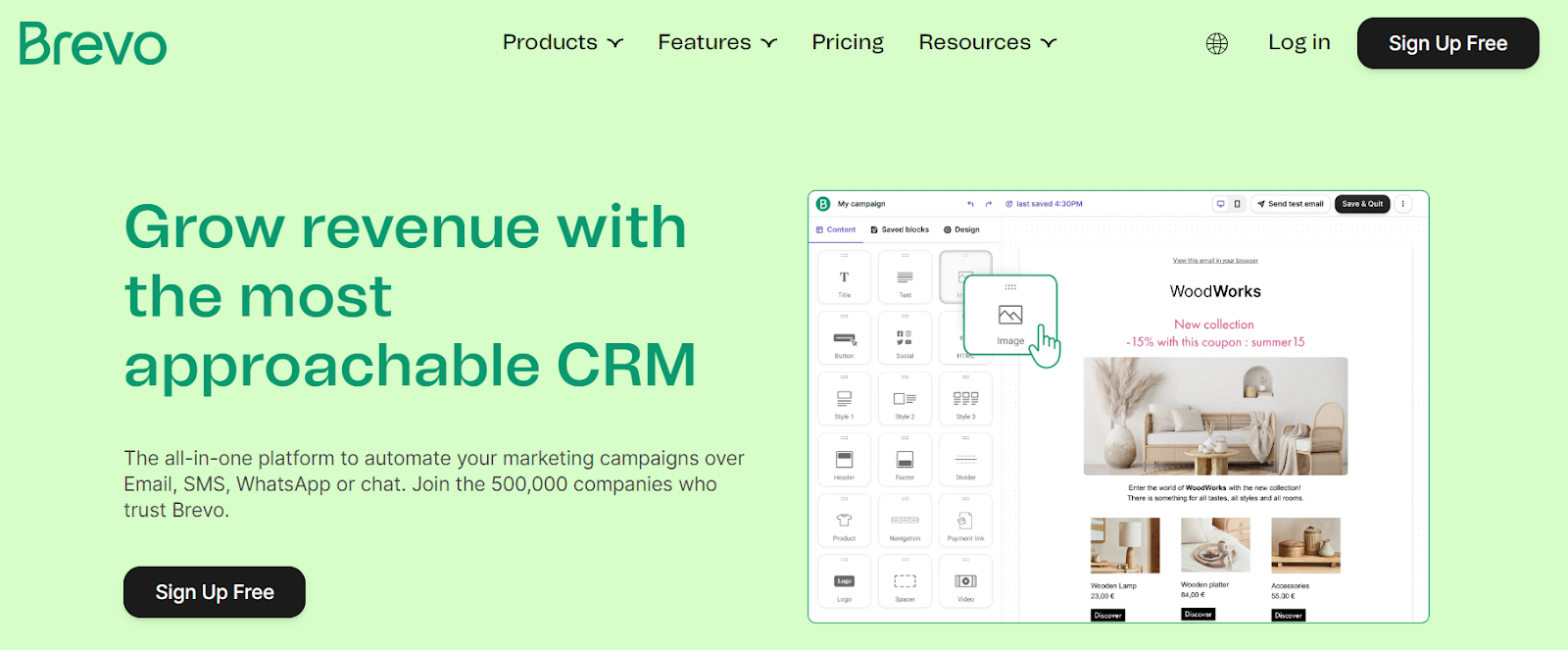
Engagebay.com
- Best for budget-friendly all-in-one marketing
- Free plan available; paid plans start at $12.99/month
EngageBay offers a comprehensive marketing, sales, and customer support suite at an affordable price, making it ideal for startups and small businesses. It includes CRM, email marketing, live chat, and automation tools, all integrated into a single platform. Users can manage leads, send targeted campaigns, and automate workflows without needing multiple subscriptions.
While it provides excellent value for money, larger businesses may find its feature set somewhat limited compared to enterprise-level solutions.
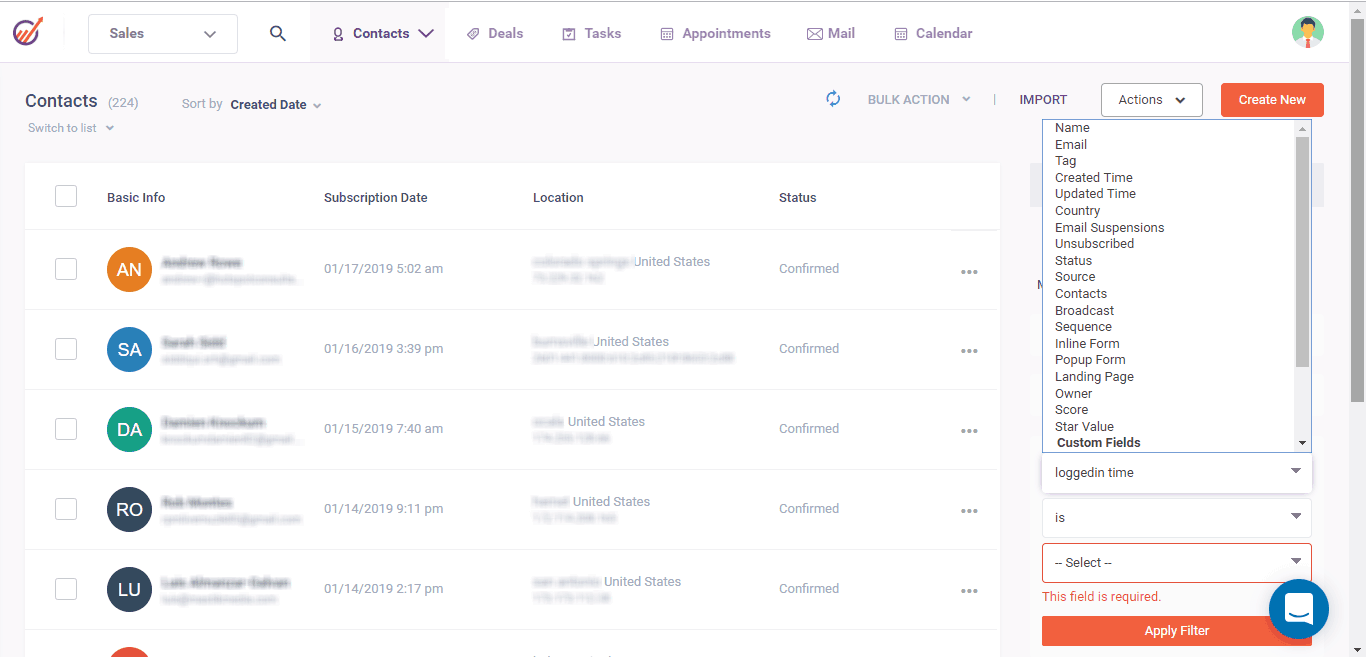
Constant Contact
- Best for email marketing
- Plans start at $9.99/month with a free 30-day trial
Constant Contact is designed to help small businesses quickly get started with organized email campaigns. It provides basic functionality in a way that’s easy for non-technical users to take advantage of, making it ideal for those who don’t anticipate needing any advanced features later on.
Constant Contact makes it simple to create and send emails, manage contact lists, track performance metrics, and more — all from one intuitive dashboard. With a drag-and-drop editor, you can build your own designs based on customizable templates even without coding knowledge. Plus, it has a mobile version too!
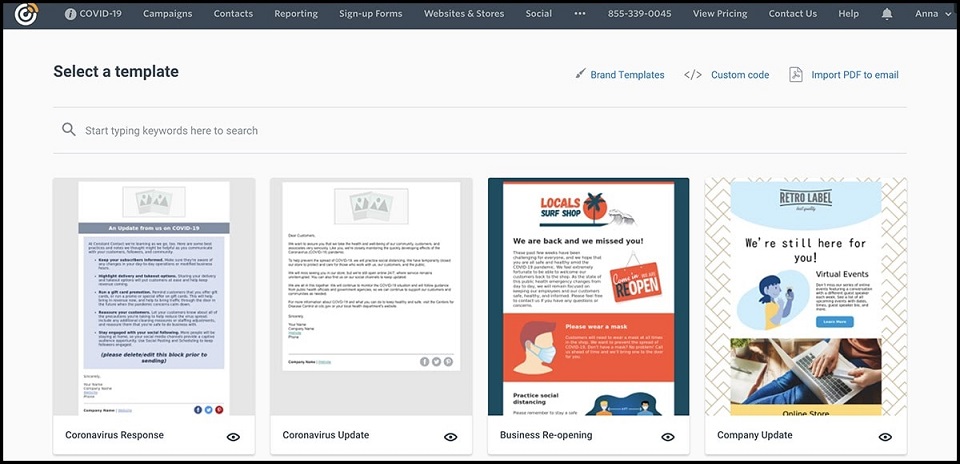
Keap
- Best for small business CRM and automation
- Starts at $249/month
Infusionsoft® By Keap is designed to help small businesses manage their customer relationships and automate repetitive marketing tasks. It includes CRM, email marketing, and appointment scheduling, making it a great tool for solopreneurs and service-based businesses.
Keap’s automation builder allows users to create tailored customer journeys, improving efficiency and engagement. However, while it simplifies marketing and sales processes, it may be too expensive for very small startups, and its interface has a learning curve.

Hootsuite
- Best for social media management
- Free 30-day trial; paid plans start at $99/month
Hootsuite is a premier social media management tool that helps businesses schedule content, monitor engagement, and analyze performance across multiple platforms from a single dashboard. It offers social listening tools that track brand mentions and industry trends, enabling businesses to engage with their audience more effectively.
Hootsuite is ideal for companies and influencers managing multiple social accounts who need a centralized solution to maintain a consistent online presence. While it provides strong analytics and automation, its pricing can be expensive for larger teams, and the lower-tier plans come with limitations on analytics depth.

Zoho Campaigns
- Best for customer relationship management (CRM)
- There’s a free plan with limited features. Paid plans start at $49/month
Zoho Campaigns is a comprehensive marketing automation tool that offers businesses the ability to create and execute automated workflows for onboarding new contacts, re-engaging lost contacts, and keeping customers informed of current deals.
Although its primary focus is email marketing, Zoho Campaigns offers other marketing automation capabilities such as trigger-based workflows, segmentation options, A/B testing, real-time analytics tracking, dynamic content insertion into webpages, and detailed reporting dashboards that provide insights into customer engagement. The platform integrates seamlessly with other Zoho products such as CRM Plus and Desk so it’s easy to manage your entire business from one place.

Choosing the Right Marketing Automation Software for Your Business
With so many options available, it’s important to understand what you need and how each marketing automation solution can help you reach your goals.
Before you shop for automation software, you must first identify your goals and objectives.
What do you want to achieve by investing in marketing automation? Are you looking for increased lead generation, improved customer engagement, or better data analysis?
Next, consider your budget and resources. Some automation software solutions are more expensive than others but may offer features that make them worth the investment.
When calculating cost, you should also factor in the implementation of the app such as training employees on how to use the system.
Finally, look for flexible marketing automation functionality and integrations before making a final decision. Consider things like email marketing capabilities, analytics tools, social media integration options as well as any third-party applications they support.
Most importantly, choose a marketing automation service with strong security measures to protect sensitive customer data from malicious actors online.
FAQs – Marketing Automation Platforms
What are examples of marketing automation?
Email marketing software is a good example of an automation platform. Email automation tools allow you to analyze customer data and patterns and send birthday emails and reminders, trigger lead-generation content, and schedule emails.
Is marketing automation a CRM?
No, marketing automation is not a CRM. Marketing automation is a software platform that helps businesses automate their marketing efforts while CRMs work hand in hand with sales automation to manage customer relationships.
Conclusion
In 2025, it’s almost impossible to run a marketing campaign without marketing automation platforms.
With the right marketing automation platform, you can speed up tasks while reducing payroll — which means more free time to focus on your customers. Ultimately, this will help ensure that your business is successful in 2025 and beyond.
Did you know it’s possible to simply add up to 100 keywords and within a few minutes get back 100 blog posts ready to go live? For as low as $0.01/word you can have your own content marketing engine without needing to handhold an AI writer through the creation process.
Check out BrandWell to see how easy it is to automate your entire content marketing process and publish content that ranks well.

